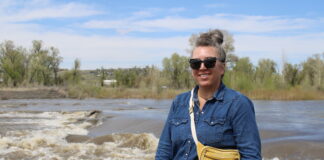
By Sarah Kuta
If you’ve watched TV in Colorado lately, chances are you’ve been bombarded with commercials for various sports betting platforms. Now, as you surf the internet, you might also see ads connecting the state’s newly legalized sports betting industry with funding for Colorado water projects.
The new #WaterWins ad campaign, paid for by the Environmental Defense Fund, aims to solidify the link between sports betting and water in Colorado. The targeted digital advertisements feature phrases like, “Want to help Colorado’s rivers, lakes and streams? You bet,” and, “A surefire winner when you bet on sports? Colorado water.”
Last November, Colorado voters agreed to legalize and tax sports betting with the passage of Proposition DD. The 10 percent tax is paid by sports betting operators based on their profits, not by bettors on their winnings.
The majority of the new tax revenue will help support Colorado’s Water Plan, a comprehensive vision for the state’s water future created in 2015. Some of the revenue will also be used for problem gambling services, including a problem gambling hotline.
“Similar to Great Outdoors Colorado, where there’s a connection between the [Colorado] lottery and parks and open space, we’re working to solidify that connection between sports betting and Colorado’s Water Plan,” said Brian Jackson, senior manager of western water for the Environmental Defense Fund.
Jackson declined to share how much the organization is spending on the ad campaign, but said it was “pennies compared to anything political.”
The goal of the campaign isn’t necessarily to encourage more sports betting, but rather to continue the conversation that Proposition DD started, Jackson said.
“We’re just having a little fun with it,” he said. “Colorado loves its sports. It’s just a different way to talk about water, an issue that’s really, really important to the state, and connect it to the actual law and revenue source itself.”
Sports betting made its Colorado debut on May 1 in the midst of the coronavirus pandemic, which effectively shuttered sports around the world. Even so, Colorado bettors wagered an impressive $25 million in the first month, which netted the state a little more than $96,000 in tax revenue.
Since then, Colorado sports betting has continued to grow in popularity, especially with more and more teams taking the field as coronavirus restrictions are lifted. Colorado bettors wagered $38 million in June, a number that leaped up again to nearly $60 million in July. State gaming officials are still calculating August numbers.
Even though sports betting launched in Colorado during an especially difficult time — when there were very few sports events to bet on — the rapid growth in recent months is promising, said Dan Hartman, director of the Colorado Division of Gaming.
“It shows the entertainment of sports betting is being embraced by Colorado folks,” said Hartman. “I don’t know if they don’t have anything else to do during the pandemic, but they’re certainly embracing it and following the different sports that are available. Overall, it’s been successful and received really well.”
In May, June and July, sports betting sent more than $555,000 in tax revenue to the state. So far none of that money has been funneled into water projects, but that’s not a surprise. The gaming division first needs to pay back the $1.7 million allocated by state legislators to get the new sports betting program up and running.
Tax revenue should begin flowing to water projects and other beneficiaries in the fall of 2021, after a full fiscal year of operations, Hartman said.
Moving forward, the sports betting program’s operating costs will be paid for with fees from licensed sports betting operators in the state. (Today, there are 10 online operators and eight retail operators licensed by the state, with capacity to add more.) This means that more of the tax revenue can go directly to water projects and other beneficiaries, Hartman said.
It’s still too early to say exactly how the revenue will be used, according to Colorado Water Conservation Board spokesperson Sara Leonard, but eventually it will help fund water-related grants within five categories: agriculture; conservation and land use; engagement and innovation; environment and recreation; and water storage and supply.
“If anything, it will take a couple years of actually seeing that revenue come in to really determine how it can be used,” Leonard said.
Meanwhile, the Colorado Water Conservation Board continues to look for creative solutions for more secure and permanent funding for the Colorado Water Plan. Even if sports betting eventually generates the maximum predicted $29 million in tax revenue each year, that’s not nearly enough to close the estimated $100 million annual funding gap for Colorado’s water needs over the next 30 years.
Gov. Jared Polis recently made local water projects one of his “Wildly Important Goals.” He called on the water conservation board to work with partners around the state to create a prioritized database of the costs of 500 ready or nearly ready local water projects by June 2021.
“We are honored that the governor recently prioritized water projects at the basin level as a new Wildly Important Goal,” Leonard said. “We are really now relying on our partners across the state to help us find these creative solutions to funding smaller-scale, local projects using the resources available.”
Sarah Kuta is a freelance writer based in Longmont, Colorado. She can be reached at sarahkuta@gmail.com.
This story originally appeared on Fresh Water News, an independent, non-partisan news initiative of Water Education Colorado. WEco is funded by multiple donors. Its editorial policy and donor list can be viewed at wateredco.org.





